Pathogenic virus-specific T cells cause disease during treatment with the calcineurin inhibitor FK506: implications for transplantation
- PMID: 20921283
- PMCID: PMC2964579
- DOI: 10.1084/jem.20100124
Pathogenic virus-specific T cells cause disease during treatment with the calcineurin inhibitor FK506: implications for transplantation
Abstract
Recently, several cases of fatal lymphocytic choriomeningitis virus (LCMV) infection occurred in transplant recipients being treated with the immunosuppressive calcineurin inhibitor FK506. These findings were surprising because LCMV is a noncytolytic virus. To understand how a noncytolytic virus can cause disease under conditions of immunosuppression, we used the mouse LCMV model and found that, similar to the observations in human transplant recipients, LCMV infection of FK506-treated mice resulted in a lethal disease characterized by viremia, lack of seroconversion, and minimal lymphocytic infiltrates in the tissues. However, despite the apparent absence of an antiviral immune response, this disease was orchestrated by virus-specific T cells. FK506 did not prevent the generation and proliferation of LCMV-specific T cells but instead altered their differentiation so that these effector T cells lost the ability to control virus but were still capable of mediating disease. These pathogenic T cells initiated a cytokine storm characterized by high levels of tumor necrosis factor (TNF) and interleukin 6 (IL-6), and depletion of T cells or blockade of these inflammatory cytokines prevented the lethal disease. Our study shows that inhibiting calcineurin can generate pathogenic T cells and indicates that T cell-mediated viral disease can occur even under conditions of immunosuppression. Furthermore, we identify a potential strategy (blockade of TNF and IL-6) for treatment of transplant recipients who have acute complications of viral infection.
Figures
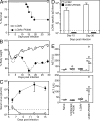



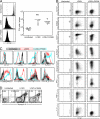


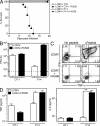
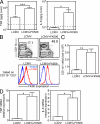
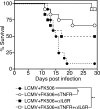
References
-
- Ahmed R., Salmi A., Butler L.D., Chiller J.M., Oldstone M.B. 1984. Selection of genetic variants of lymphocytic choriomeningitis virus in spleens of persistently infected mice. Role in suppression of cytotoxic T lymphocyte response and viral persistence. J. Exp. Med. 160:521–540 10.1084/jem.160.2.521 - DOI - PMC - PubMed
-
- Borrow P., Oldstone M.B.A. 1997. Lymphocytic choriomeningitis virus. Viral pathogenesis. Nathanson N., editor Lippincott-Raven, Philadelphia: 593–627
-
- Buchmeier M.J., de la Torre J.C., Peters C.J. 2007. Arenaviridae: The viruses and their replication. Fields Virology. Vol. 2 Knipe D.M., Howley P.M., Lippincott Williams & Wilkins, Philadelphia: 1791–1827
Publication types
MeSH terms
Substances
Grants and funding
LinkOut - more resources
Full Text Sources
Other Literature Sources
Research Materials

